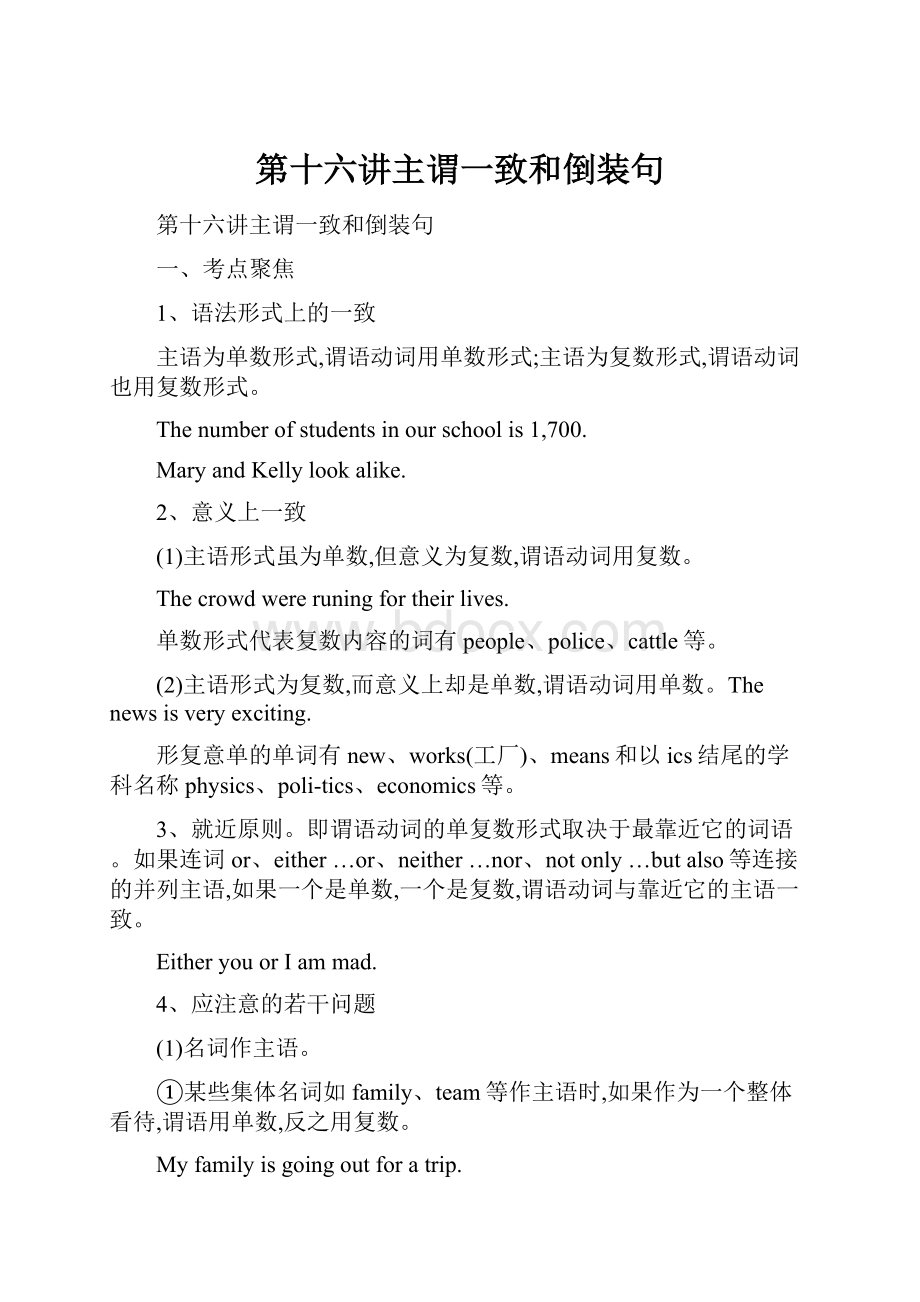第十六讲主谓一致和倒装句.docx
《第十六讲主谓一致和倒装句.docx》由会员分享,可在线阅读,更多相关《第十六讲主谓一致和倒装句.docx(13页珍藏版)》请在冰豆网上搜索。

第十六讲主谓一致和倒装句
第十六讲主谓一致和倒装句
一、考点聚焦
1、语法形式上的一致
主语为单数形式,谓语动词用单数形式;主语为复数形式,谓语动词也用复数形式。
Thenumberofstudentsinourschoolis1,700.
MaryandKellylookalike.
2、意义上一致
(1)主语形式虽为单数,但意义为复数,谓语动词用复数。
Thecrowdwereruningfortheirlives.
单数形式代表复数内容的词有people、police、cattle等。
(2)主语形式为复数,而意义上却是单数,谓语动词用单数。
Thenewsisveryexciting.
形复意单的单词有new、works(工厂)、means和以ics结尾的学科名称physics、poli-tics、economics等。
3、就近原则。
即谓语动词的单复数形式取决于最靠近它的词语。
如果连词or、either…or、neither…nor、notonly…butalso等连接的并列主语,如果一个是单数,一个是复数,谓语动词与靠近它的主语一致。
EitheryouorIammad.
4、应注意的若干问题
(1)名词作主语。
①某些集体名词如family、team等作主语时,如果作为一个整体看待,谓语用单数,反之用复数。
Myfamilyisgoingoutforatrip.
ThewholefamilyarewatchingTV.
这类词常有audience、classclub、committee、company、crew、crowd、enemy、government、group、party、public、team等。
Population和“agroup(crowd)of+复数名词”也适用于这种情况,强调整体用单数,强调各个部分用复数。
②某些集体名词如people、police、cattle、oxen只当复数看待,谓语动词必须用复数。
③单、复数同形的名词作主语时,谓语动词应根据意义决定单、复数。
Asheepisoverthere.Somesheepareoverthere.
④名词所有格之后的名词被省略,这种情况一般只指商店、工场、住宅等;作主语时,动词一般用单数。
Myuncle’sisnotforfromhere.
常见的省略名词有thebaker’s、thebarbar’s、theZhang’s等。
表示店铺的名词一般作集体名词看待,但用作主语时,谓语动词往往用复数。
如:
Richardson’shavealotofoldgoodstosell.
⑤当名词词组中心词为表示度量、距离、金额、时间、书名等复数名词时,往往可以根据意义一致的原则,把这些复数名词看作一个
整体,谓语用单数。
Thirtyyearshaspassed.
Fiveminutesisenoughtofinishthetask.
⑥不定代词each、every、no所修饰的名词即使以and或逗号连接成多主语时,谓语动词仍用单数形式。
如:
Eachboyandeachgirlinmyclasshasadictionary.
⑦如果主语有morethanone…或manya…构成,尽管从意义上
看是复数内容,但它的谓语动词用单数形式。
Morethanonestudenthasseentheplay.
Manyaboyhasboughtthatkindoftoy.
但是,“more+复数名词+thanone”结构之后,谓语用复数。
⑧一些由两个部分构成的名词表示衣物或工具作主语时,谓语通常用复数形式。
如glasses、clothes、trousers、shoes、compasses、chopsticks、scissors等。
但如果主语用akindof、apairof、aseriesof等加名词构成时,谓语动词一般用单数形式。
Apairofshoeswasonthedesk.
⑨thiskindofbook=abookofthiskind(这种书),其谓语动词;短语thiskindofmen=menofthiskind=thesekindof
men(口语)(这一类人),但thiskindofmen的谓语用单数,menofthiskind和thesekindofmen的谓语用复数,allkindsof后跟复数名词,谓语用复数形式。
如:
Thiskindofmenisdangerous.
Menoftheiskind/sortaredangerous.
⑩复数形式的单、复数同形名词作主语时,按意义一致的原则,用作单数意义时,谓语用单数,反之,谓语用复数。
这类名词有means、works、species(种类)、Chinese、Japanese等。
当它们的前面有a、sucha、this、that修饰时,谓语用单数;有all、such、these、those修饰时,谓语用复数。
○11如果名词词组中心词是all、most、half、rest等词语,所指是复数意义,谓语动词用复数形式,反之用单数。
Allofmystudentsworkhard.
Alloftheoilisgone.
○12在主谓倒装的句子中,谓语动词的数应与其后的主语一致。
如:
Betweenthetwowindowshangsanoilpainting.
(2)由连接词连接的名词作主语。
①用and或both…and连接并列主语,谓语动词通常用复数形式。
但如果并列主语指的是同一个人,同一事物或同一概念时,谓语动词用单数形式,这时and后面的名词没有冠词。
Truthandhonestyisthebestpolicy.
Toloveandtobelovedisthegreathappiness.
Goingtobedearlyandgettingupearlyisagoodhabit.
Aknifeandforkisonthetable.
②当主语后面跟有aswellas、asmuchas、nolessthan、alongwith、with、like、ratherthan、togetherwith、but、except、besides、including、inadditionto等引导的词组时,采取“就远原则”。
③以or、either…or、neigher…nor、notonly…butalso等连接的词作主语时,采取“就近原则”。
(3)代词作主语。
①名词型物主代词连接的动词,既可以用单数,也可以用复数,这取决于它所代替的是单数还是复数。
Ours(OurParty)isagreatParty.
Yourshoesarewhite,mine(=myshoes)areblack.
②such、thesame起指示代词作用时,应根据其所指的内容来决定单、复数。
Suchisourplan.Sucharehislastwords.
③关系代词who、that、which等在定语从句中作主语时,其谓语动词的数应与句中先行词的数一致。
④疑问词who、what、which作主语时,谓语动词可根据说话人所要表达的意思决定单、复数。
Wholivesnextdoor?
ItisXiaoLiu.
Wholivesnextdoor?
ItisWangandLi.
⑤不定代词any、either、neither、none、all、some、more等作主语时,要注意下列情况:
(A)单独作主语时,视其在文中的意义,动词可用单数或复数
形式。
Nowallhasbeenchanged.Allarepresent.(B)其后接of时,若of的宾语为不可数名词,动词用单数形式;若of的宾语为复数名词或代词时,动词可以是单数,也可以是复数;在正式文体中,单数形式的动词更常用。
Do(es)anyofyouknowabouttheaccident?
Noneofushas(have)seenthefilm.
(4)分数、量词作主语。
①“分数或百分数+名词”构成的短语以及由“alotof,lotsof,plentyof,alargequantityof,aheapof,heapsof,halfof+名词”构成的短语作主语时,其谓语动词要与短语中of后面的名词的数保持一致,这是因为短语中后面的名词是中心词,而短语中前面的量词是修饰语。
如:
Lotsofdamagewascausedbyflood.
Anumberofstudentshavegonetothecountryside.
Alargequantityofpeopleisneededhere.
Quantitiesoffood(nuts)werestillonthetable.
②agreatdealof、alargeamountof修饰不可数名词,其短语作主语时,谓语动词通常用单数;largeamountsof修饰不可数名词,其短语作主语时,谓语动词通常用复数。
③表示数量的oneandahalf后,名词要用复数形式,但是其短语作主语时,谓语动词用单数形式。
Oneandahalfapplesisleftonthetable.
④halfof、(a)partof修饰可数名词单数及不可数名词时,谓语动
词用单数,修饰可数名词复数时,谓语动词用复数。
(5)名词化的形容词作主语。
如果主语由“the+形容词(或分词)”结构担任时,谓语通常用复数。
这类词有therich、thepoor、thebrave、theinjured、theliving、thewounded等。
如表抽象的也可以用单数,如theunknown、thebeautiful等。
(6)从句作主语。
①由what引导的主语从句,谓语动词通常用单数,但所指的具体内容是复数意义时,谓语动词一般用复数形式。
Whatweneedismoremoney.
Whatweneedaremorepeople/teachers.
②在“oneof+复数名词+who/that/which”引导的从句结构中,关系代词who/that/which的先行词是靠近它的复数名词而不是one,因此从句中的谓语动词也应该是复数形式。
如one前有theonly则用单数形式。
Thisisoneofthemostinterestingstoriesthathavebeentoldbymyfather.
Shewastheonlyoneofthegirlswhowaslateforclasstoday.
(7)不定式、名动词(短语)作主语用单数形式;Therebe句型中be的单复数取决于be后的第一个词的数。
Thereisabook,twopensonthedesk.
Therearetwopens,abookonthedesk.
5、倒装句的要点复习
(1)在以there、here、now、then、such引导的,引起人们注意的招呼句要倒装。
Theregoesthebell.Herecomesthebus.
(2)表示动态的状语,置于句首时,句子要倒装。
Offwentthehorse.Incametheboss.
Fromthespeakercomesthedoctor’svoice.
(3)表示地点的词语置于句首或强调地点概念时。
Southofthetownlietwosteelfactories.
Betweenthetwobuildingsstandsatalltree.
注意:
句子的主语为人称代词时,句子不倒装。
Hereitis.Awaytheywent.
(4)否定词never、seldom、hardly、scarcely、barely、rarely、little、not、nowhere、bynomeans、atnotime、neither、nor等放在句首时,句子常倒装。
如:
Bynomeansshallwegiveup.
NeverhaveIbeentotheUSA.
Seldomdoesshegetuplateinthemorning.
(5)在notonly…butalso…nosooner…than…、hardly…when…、scarcely…when…、notuntil…、so…that…、such…that…句型中,主句倒装,从句不倒装,但要注意:
neither…nor…连接的句子前后两个分句都要倒装。
Notonlyisshesmartbutalsosheisbeautiful.
Suchgreatprogressdidhemakethathewaspraised.
SoheavyistheboxthatIcan’tcarryit.
Neitherhasheapencil,norhasheapen.
(6)Only+状语或状语从句+其他(only在句首时要倒装)。
OnlythendidIrealizetheimportanceoflearningEnglish.
(7)so、neither、nor放在句首时,表示前面的情况也适用于另一个人或物时,用部分倒装。
(8)表语或状语或动词原形+as/though+主语+其他时,句子要倒装。
(在让步状语从句中)
(9)虚拟语气中用倒装代替if。
WereIyou,Iwouldgothereatonce.
Hadyoucomeyesterday,youcouldhavehelpedus.
(10)在一些表示祝愿的句子中。
LongliveChina!
中考在线:
1.—Eachofthestudents,workinghardathisorherlessons,_________togotouniversity.
—SodoI.
A.hope
B.hopes
C.hoping
D.hoped
2.Thenumberofpeopleinvited_________fifty,butanumberofthem__________absentfordifferentreasons.
A.were;was
B.was;was
C.was;were
D.were;were
3.—Davidhasmadegreatprogressrecently.
—_______,and__________.
A.Sohehas;soyouhave
B.Sohehas;sohaveyou
C.Sohashe;sohaveyou
D.Sohashe;soyouhave
Exercise
()1.-Haveyougotsomewatertodrink?
-Hereyouare.There___stillsomeinthebottle.
A.are
B.were
C.is
D.was
()2.____theremanyAmericanfriendsintheschoollastFriday?
A.Is
B.Was
C.Are
D.Were
()3.There____agreatmanyaccidentslastyear.
A.were
B.are
C.is
D.was
Part2
()1.In1850,aboutathirdofU.S.A___coveredbyforests.
A.were
B.hasbeen
C./
D.was
()2.Mostofourearth____coveredbywater.
A.are
B.is
C.was
D.were
()3.Sunday____thefirstdayoftheweek.
A.is
B.are
C.am
D.be
Part3
()1.ThePopulationoftheworld____still____now.
A.has;grown
B.will;grow
C.is;growing
D.isgrown
()2.There_manypeoplerunningintheparkeverymorning.
A.is
B.were
C.are
D.have
()3.Thesepoliceoften___thechildrenacrossthestreet.
A.help
B.helps
C.helping
D.ishelping
Part4
()1.___goingtoEnglandbyairnextweek.
A.TheGreenfamilyare
B.TheGreensfamilyare
C.TheGreen'sfamilyare
D.Greenfamilyare
()2.Thewholefamily__enjoyingthebeautifulmusicnow.
A.isall
B.allis
C.allare
D.areall
()3.Ourclass___big.
A.is
B.are
C.were
D.will
Part5
()1.NeitherhenorI____fromCanada.WearefromAustralia.
A.is
B.are
C.am
D.be
()2.Eitheryouorhe____right.
A.are
B.is
C.does
D.were
()3.NeitherMarynorherbrother____goodatsinging.
A.is
B.are
C.isnot
D.arenot
()4.NotonlyTombutalsoAliceandMary____busy.
A.is
B.was
C.are
D.has
倒装句:
1.NotuntilIbegantowork____howmuchtimeIhadwasted.
A.didn'tIrealize
B.didIrealize
C.Ididn'trealize
D.Irealized
2.Onlybypractisingafewhourseveryday____beabletomaster
thelanguage.
A.youcan
B.canyou
C.youwill
D.willyou
3.Ifyoudon'tgo,neither____.
A.shallI
B.doI
C.Ido
D.Ishall
4.Nosooner____tothestation____thetrainleft.
A.hadIgot,when
B.Ihadgot,than
C.hadIgot,than
D.didIget,when
5.——Yourfatherisverystrictwithyou.
____.Heneverletsoffasinglemistakeofours.
A.Soheis
B.Soishe
C.Heisso
D.Sodoeshe
6.____today,hewouldgettherebySunday.
A.Wouldheleave
B.Washeleaving
C.Werehetoleave
D.Ifheleave
7.Neverinmylife____suchathing.
A.Ihaveheardorhaveseen
B.haveIheardorseen
C.Ihaveheardorseen
D.didIhearorsee
8.——Here____!
WhereisXiaoLiu?
There____.
A.comesthebus,ishe
B.comesthebus,heis
C.thebuscomes,ishe
D.thebuscomes,heis
9.____,Iwillnotbuyit.
A.MuchasdoIlikeit
B.AsmuchIlikeit
C.MuchasIlikeit
D.AsIlikeitmuch
10.——Ilikefootball.Idon'tlikevolleyball.
____.
A.SodoI
B.NeitherdoI
C.Soitiswithme
D.Soisitwithme